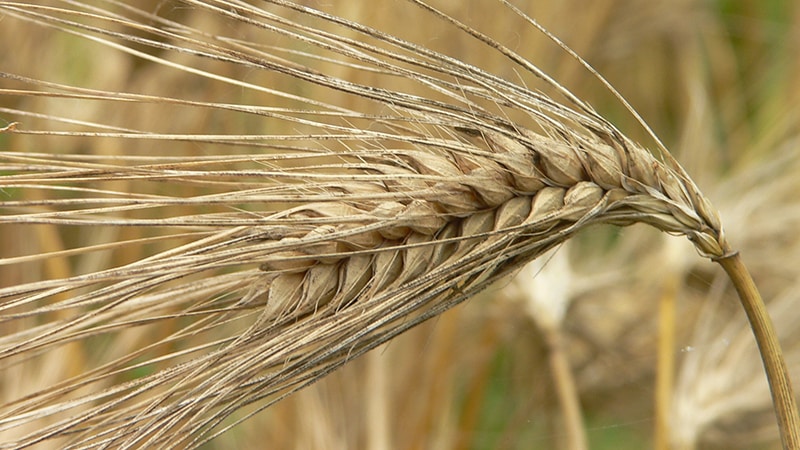Beware of gluten: does barley contain it?
The word “gluten” has become quite popular. Grocery stores are offering products labeled "Gluten Free" and celebrities are adopting gluten-free diets. Whether barley, the favorite of everyone who loses weight, contains gluten or not, we’ll find out in this article.
Chemical composition, trace elements and beneficial properties of barley
Barley has a high calorie content. There are 354 calories per 100 g of product.
The chemical composition of barley varies depending on the climate, variety and quality of the growing soil.
Main organic substances in the composition:
- proteins – globulin, albumin, protamine;
- carbohydrates - polysaccharides, sugars, starch, fiber.

Nutritional value of barley per 100 g:
- carbohydrates – 56.18 g;
- dietary fiber – 17.3 g;
- proteins - 12.48 g;
- water – 9.44 g;
- fats – 2.3 g;
- ash – 2.29 g.
Chemical composition of barley per 100 g:
- niacin (B3) – 4.604 mg;
- thiamine (B1) – 0.646 mg;
- tocopherol (E) – 0.57 mg;
- pyridoxine (B6) – 0.318 mg;
- riboflavin (B2) – 0.285 mg;
- pantothenic acid (B5) – 0.282 mg;
- folic acid (B9) – 0.019 mg;
- beta-carotene (A) – 0.013 mg;
- phylloquinone (K) – 0.0022 mg.
Barley is rich in microelements; it contains iron, zinc, manganese, copper, and selenium. The vitamins, minerals and trace elements contained in cereals benefit the entire body. For example, phosphorus improves metabolism and brain function. Lysine and hordecine have antiviral and antifungal effects.
Reference. If you eat sprouted or soaked barley, the beneficial substances are better absorbed by the body.
Beneficial properties of cereals for the human body:
- has a positive effect on the functioning of the gastrointestinal tract - the high fiber content in barley normalizes the intestinal microflora, prevents constipation and hemorrhoids;
- the feeling of satiety lasts longer due to the presence of dietary fiber in the product - a person eats less and does not gain extra calories;
- the risk of developing cancer pathologies is reduced due to the content of phenolic compounds in barley - a decoction of barley grains helps in the prevention of breast, colon and prostate cancer;
- Magnesium in cereals reduces the risk of developing diabetes – lowers blood sugar levels.
Decoctions, porridges, and infusions of barley are actively used in folk medicine: the cereal is an excellent remedy for colds.
What foods contain gluten?

Gluten is an elastic protein, a residue from the leaching of starch from wheat flour, otherwise known as “gluten.”
Gluten is found in the following products:
- cereals;
- bread;
- bakery;
- pasta;
- sauces;
- canned food;
- sweets;
- sausage;
- ice cream;
- alcohol.
Gluten is included in many popular drinks. It contains: Coca-Cola, Pepsi, instant coffee, vodka, cocoa, beer, whiskey. Gluten is found in small quantities in butter and ghee, in some dairy products, and frozen vegetables. Gluten can even be contained in cosmetics - lipstick, powder, body cream.
Reference. If the package says “hydrolyzed vegetable protein” or “textured vegetable protein”, this means that the product definitely contains gluten.
Is there gluten in barley and in what quantity?
Without a doubt, barley contains gluten. Content in the product is up to 2.3%. Because of its gluten, barley is used as an additive in many foods.Gluten’s ability to enhance taste and aroma and have a preservative effect makes it indispensable for large food manufacturers.
Reference. Barley malt is used as a sweetener in the production of many food products.
Why is gluten harmful?
Gluten is harmful for people with celiac disease. Celiac disease is a disease, in which an inflammatory reaction develops in the human body in response to the ingestion of gluten. The immune system of such people perceives this protein as foreign and begins to attack it.
Why is celiac disease dangerous?

The problem is that during the immune response, not only the “foreign” gluten is affected, but also the tissues surrounding it.
The organs of the gastrointestinal tract, especially the small intestine, are the first to be damaged. In addition to the digestive system, the brain, heart, musculoskeletal system and other organs may be affected.
In a number of clinical situations, celiac disease does not manifest itself in any way and proceeds in a latent form. If gluten intolerance is suspected, a special analysis is performed.
Signs of celiac disease:
- bloating;
- abdominal pain;
- constant constipation;
- vomit;
- weight loss;
- feeling tired;
- pain in joints and muscles;
- headache;
- memory and attention impairment;
- depression.
If the correct diagnosis is not made in time, various systems in the body begin to malfunction. Due to poor absorption of nutrients, problems with tooth enamel and osteoporosis occur. In women, the menstrual cycle is disrupted and other gynecological diseases appear. In children, advanced celiac disease causes severe disorders of the nervous system.
Reference. In children, celiac disease often manifests itself with classic symptoms, and in adults, in most cases, the disease proceeds atypically, hidden.
Gluten intolerance may lead to lactose intolerance - milk and milk-containing products.
Celiac disease without proper treatment and diet leads to food allergies.
How to avoid unpleasant health problems? A healthy lifestyle and diet will help cope with the disease. You can find a tasty substitute for even regular bread. There are a number of products for a gluten-free diet that will allow you to create a complete diet.
Read also:
Dangerous gluten: is it contained in oats?
What experts say about gluten
There is no scientific data that proves the benefits or harm of gluten for the human body. Many social media users and celebrities speak out about gluten only from personal experience.
Many people believe that a gluten-free diet will help get rid of digestive problems. But American nutritionists claim that eliminating gluten has no effect on diseases and disorders of the gastrointestinal tract.
The general opinion of doctors is that if a person does not suffer from celiac disease, there is no need to exclude gluten from the diet. For people who do not have celiac disease, gluten is not harmful.
Interesting fact. And for those who suffer from gluten intolerance, there is good news. Scientists of the 1st Moscow State Medical University named after. THEM. Sechenov are conducting preclinical trials of the world's first drug for gluten intolerance. It is quite possible that after all the necessary tests, a new remedy for celiac disease will appear in pharmacies.
Conclusion
Barley is a healthy product, but people suffering from celiac disease should not eat this grain. Only people with intolerance have to adhere to a gluten-free diet, and healthy people can safely consume barley in any form - this will only benefit the body.